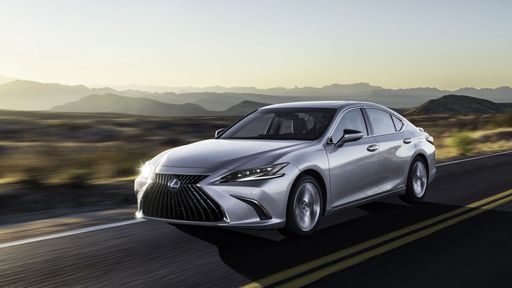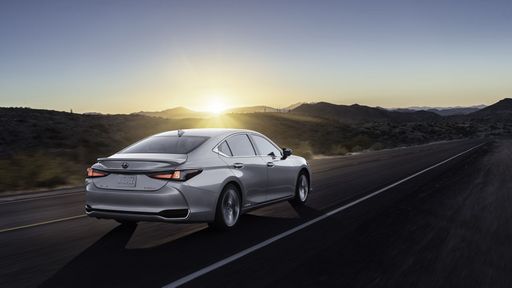Lexus ES vs Toyota C-HR - Differences and prices compared
Compare performance (218 HP vs 223 HP), boot space and price (46600 £ vs 29100 £ ) at a glance. Find out which car is the better choice for you – Lexus ES or Toyota C-HR?
Costs and Efficiency:
Looking at overall running costs, both models reveal some interesting differences in everyday economy.
Toyota C-HR has a convincingly advantage in terms of price – it starts at 29100 £ , while the Lexus ES costs 46600 £ . That’s a price difference of around 17451 £.
Fuel consumption also shows a difference: Toyota C-HR manages with 0.80 L and is therefore clearly more efficient than the Lexus ES with 5.10 L. The difference is about 4.30 L per 100 km.
Engine and Performance:
Power, torque and acceleration are the classic benchmarks for car enthusiasts – and here, some clear differences start to show.
When it comes to engine power, the Toyota C-HR has a barely noticeable edge – offering 223 HP compared to 218 HP. That’s roughly 5 HP more horsepower.
In acceleration from 0 to 100 km/h, the Toyota C-HR is evident quicker – completing the sprint in 7.40 s, while the Lexus ES takes 8.90 s. That’s about 1.50 s faster.
There’s no difference in top speed – both reach 180 km/h.
Space and Everyday Use:
Cabin size, boot volume and payload all play a role in everyday practicality. Here, comfort and flexibility make the difference.
Both vehicles offer seating for 5 people.
In curb weight, Toyota C-HR is to a small extent lighter – 1505 kg compared to 1680 kg. The difference is around 175 kg.
In terms of boot space, the Lexus ES offers barely noticeable more room – 454 L compared to 447 L. That’s a difference of about 7 L.
When it comes to payload, Lexus ES barely noticeable takes the win – 470 kg compared to 425 kg. That’s a difference of about 45 kg.
Who wins the race?
The Toyota C-HR proves to be leaves the rival little chance and therefore becomes our DriveDuel Champion!
Toyota C-HR is the better all-rounder in this comparison.

Toyota C-HR
Costs and Consumption
View detailed analysis
Engine and Performance
View detailed analysis
Dimensions and Body
View detailed analysis
Lexus ES
The Lexus ES delivers a supremely comfortable, quietly luxurious experience that favors serene cruising over sporting theatrics. It wraps everyday practicality, top-notch build quality and unimpeachable reliability in a handsome, grown-up package that will appeal to buyers who prize calm refinement over headline-grabbing excitement.
details


Toyota C-HR
The Toyota C-HR cuts a striking figure with its angular styling and coupe-like profile, so you’ll never go unnoticed in the supermarket car park. It balances everyday practicality with a nimble, city-friendly personality, making routine commutes feel a touch more fun without asking for forgiveness.
details




Costs and Consumption |
|
|---|---|
|
Price
46600 - 59300 £
|
Price
29100 - 42800 £
|
|
Consumption L/100km
5.10 L
|
Consumption L/100km
0.8 - 5.1 L
|
|
Consumption kWh/100km
-
|
Consumption kWh/100km
-
|
|
Electric Range
-
|
Electric Range
68 km
|
|
Battery Capacity
-
|
Battery Capacity
-
|
|
co2
115 g/km
|
co2
17 - 115 g/km
|
|
Fuel tank capacity
50 L
|
Fuel tank capacity
43 L
|
Dimensions and Body |
|
|---|---|
|
Body Type
Sedan
|
Body Type
SUV
|
|
Seats
5
|
Seats
5
|
|
Doors
4
|
Doors
5
|
|
Curb weight
1680 kg
|
Curb weight
1505 - 1755 kg
|
|
Trunk capacity
454 L
|
Trunk capacity
350 - 447 L
|
|
Length
4975 mm
|
Length
4362 mm
|
|
Width
1865 mm
|
Width
1832 mm
|
|
Height
1445 mm
|
Height
1558 - 1564 mm
|
|
Max trunk capacity
-
|
Max trunk capacity
1076 - 1155 L
|
|
Payload
470 kg
|
Payload
375 - 425 kg
|
Engine and Performance |
|
|---|---|
|
Engine Type
Full Hybrid
|
Engine Type
Full Hybrid, Plugin Hybrid
|
|
Transmission
Automatic
|
Transmission
Automatic
|
|
Transmission Detail
CVT
|
Transmission Detail
CVT
|
|
Drive Type
Front-Wheel Drive
|
Drive Type
Front-Wheel Drive, All-Wheel Drive
|
|
Power HP
218 HP
|
Power HP
140 - 223 HP
|
|
Acceleration 0-100km/h
8.90 s
|
Acceleration 0-100km/h
7.4 - 9.9 s
|
|
Max Speed
180 km/h
|
Max Speed
175 - 180 km/h
|
|
Torque
-
|
Torque
-
|
|
Number of Cylinders
4
|
Number of Cylinders
4
|
|
Power kW
160 kW
|
Power kW
103 - 164 kW
|
|
Engine capacity
2487 cm3
|
Engine capacity
1798 - 1987 cm3
|
General |
|
|---|---|
|
Model Year
2024
|
Model Year
2024 - 2025
|
|
CO2 Efficiency Class
C
|
CO2 Efficiency Class
C, B
|
|
Brand
Lexus
|
Brand
Toyota
|
Is the Lexus ES offered with different drivetrains?
The Lexus ES is offered with Front-Wheel Drive.




